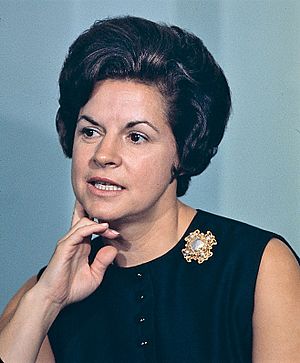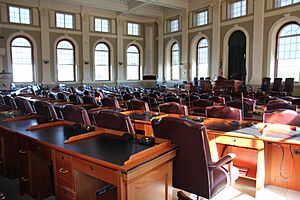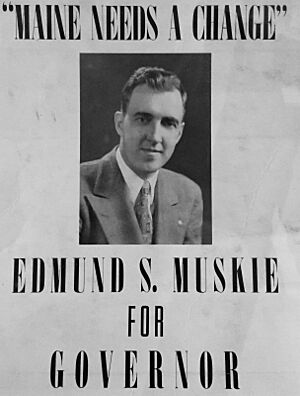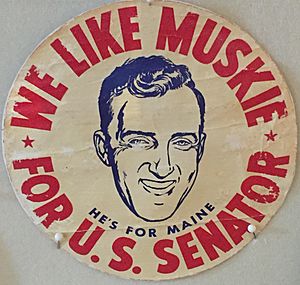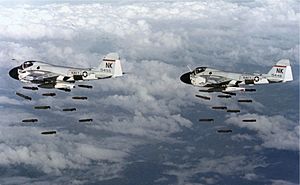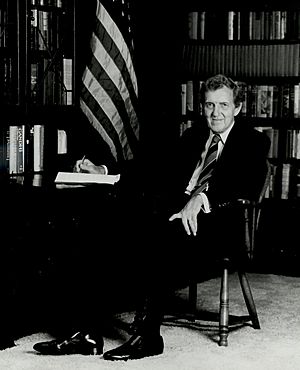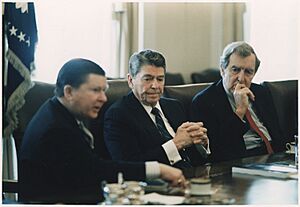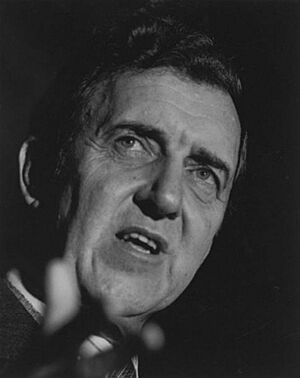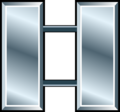Edmund Muskie facts for kids
Quick facts for kids
Edmund Muskie
|
|
|---|---|
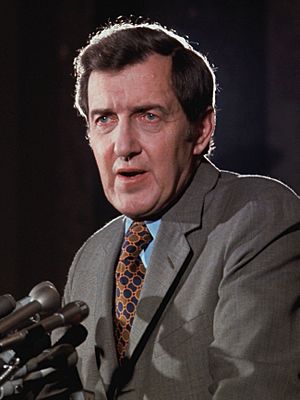
Muskie in 1971
|
|
| 58th United States Secretary of State | |
| In office May 8, 1980 – January 18, 1981 |
|
| President | Jimmy Carter |
| Deputy | Warren Christopher |
| Preceded by | Cyrus Vance |
| Succeeded by | Alexander Haig |
| Chair of the Senate Budget Committee | |
| In office January 3, 1975 – May 8, 1980 |
|
| Preceded by | Position established |
| Succeeded by | Fritz Hollings |
| Chair of the Democratic Senatorial Campaign Committee | |
| In office January 3, 1967 – January 3, 1969 |
|
| Preceded by | Position established |
| Succeeded by | Bennett Johnston |
| United States Senator from Maine |
|
| In office January 3, 1959 – May 7, 1980 |
|
| Preceded by | Frederick Payne |
| Succeeded by | George Mitchell |
| 64th Governor of Maine | |
| In office January 5, 1955 – January 2, 1959 |
|
| Preceded by | Burton Cross |
| Succeeded by | Robert Haskell |
| Member of the Maine House of Representatives from the 110th district |
|
| In office December 5, 1946 – November 2, 1951 |
|
| Preceded by | Charles Cummings |
| Succeeded by | Ralph Farris |
| Personal details | |
| Born |
Edmund Sixtus Muskie
March 28, 1914 Rumford, Maine, U.S. |
| Died | March 26, 1996 (aged 81) Washington, D.C., U.S. |
| Resting place | Arlington National Cemetery |
| Political party | Democratic |
| Spouse |
Jane Gray
(m. 1948) |
| Children | 5 |
| Education | Bates College (BA) Cornell University (LLB) |
| Signature | |
| Military service | |
| Allegiance | United States |
| Branch/service | United States Navy |
| Years of service | 1942–1945 |
| Rank | |
| Unit | U.S. Naval Reserve |
| Battles/wars |
|
Edmund Sixtus Muskie (March 28, 1914 – March 26, 1996) was an important American political leader. He served as the 58th United States Secretary of State under President Jimmy Carter. Before that, he was a U.S. Senator for Maine from 1959 to 1980. He also served as the 64th governor of Maine from 1955 to 1959. Muskie was the Democratic Party's candidate for Vice President in the 1968 election.
Born in Rumford, Maine, Muskie worked as a lawyer before joining the United States Navy Reserve during World War II. After the war, he served in the Maine Legislature. He became Governor of Maine in 1954, focusing on growing the economy and protecting the environment. As a Senator, he helped pass major laws like the Clean Air Act of 1970 and the Clean Water Act of 1972. He also supported the Civil Rights Act of 1964. Muskie ran for president in 1972 but faced challenges that affected his campaign. Later, he became the first chairman of the Senate Budget Committee. He ended his public service as Secretary of State, helping to negotiate the release of American hostages in Iran.
Contents
- Edmund Muskie: A Life in Public Service
- Images for kids
- See also
Edmund Muskie: A Life in Public Service
Early Life and School Days
Edmund Sixtus Muskie was born on March 28, 1914, in Rumford, Maine. His father, Stephen Marciszewski, came from Poland and changed his name to Muskie. His mother, Josephine, was from a Polish-American family. Edmund's first language was Polish, which he spoke until he was four years old. He later learned English and lost his Polish fluency.
As a young person, Muskie enjoyed fishing, hunting, and swimming. He was a bit shy but had many friends. He attended Stephens High School, where he played baseball and was elected student body president. He graduated in 1932 as the top student in his class.
Muskie was inspired by politics and attended Bates College in Maine. He was a successful member of the debate team and was elected to student government. He worked hard during summers to pay for college, as he came from a modest background. He graduated in 1936 and then went to Cornell Law School, graduating in 1939. After passing the Maine Bar exam in 1940, he started his own law practice in Waterville, Maine.
His Family Life
Edmund Muskie married Jane Frances Gray in 1948. Jane was born in Waterville in 1927. They met when she was 19 and he was 32. They had five children together: Stephen, Ellen, Melinda, Martha, and Edmund Jr. The Muskie family lived in a yellow cottage at Kennebunk Beach when they were in Maine.
In 1942, during World War II, Muskie joined the United States Naval Reserve. He was 28 years old. He trained as a diesel engineer and later became a Deck Officer. In 1944, he began active duty aboard the destroyer escort USS Brackett. His ship protected U.S. convoys from Japanese submarines in the Pacific. He was discharged from the Navy in December 1945.
Starting in Politics: Maine Legislature
After returning to Maine in 1946, Muskie decided to enter politics. He successfully ran for the Maine House of Representatives for the 110th District. At this time, Republicans held most of the seats in the Maine Legislature. Muskie was known for working with both political parties, which earned him wide support.
He later ran for Mayor of Waterville but did not win. In 1948, he returned to the Maine House for his second term, serving as the Minority Leader. In 1951, he left the House to work for the Maine Economic Stabilization Agency. This job helped him become more well-known across Maine.
Governor of Maine
In 1954, Edmund Muskie ran for Governor of Maine as a Democrat. Many people thought he would lose because the Republican Party was very strong in Maine. Muskie ran on a platform of protecting the environment and investing in public services. His main campaign slogan was "Maine Needs A Change."
He won the election, becoming the first Democrat elected Governor of Maine in 20 years. His victory was seen as a big moment that helped the Democratic Party grow stronger in Maine.
A Governor's Impact
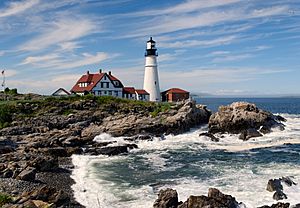
Muskie became the 64th Governor of Maine on January 6, 1955. He was also the state's first Roman Catholic governor. Even though the legislature was mostly Republican, Muskie worked with both parties to pass many of his plans. He focused on controlling water pollution and signed an agreement with other states to help with this.
He also worked to improve Maine's economy. He expanded Baxter State Park and bought land for Cape Elizabeth. He created new departments to help with business and industry. Muskie was re-elected in 1956. During his second term, he invested in building new highways and roads. He also increased spending on public education and hospitals. He helped businesses by making it easier for them to get money and increased the minimum wage.
Muskie changed the governor's term from two years to four years. He also moved Maine's general election date from September to November. This change ended the old saying, "as Maine goes, so goes the nation," which meant Maine's early election results often predicted the national outcome. Muskie resigned on January 2, 1959, to become a U.S. Senator.
Senator for Maine
Edmund Muskie was elected to the United States Senate in 1958, defeating the Republican Senator. He was one of many Democrats who won seats that year, making the Democratic Party stronger. He was re-elected in 1964, 1970, and 1976.
Protecting Our Environment
Muskie became a U.S. Senator on January 3, 1959. He quickly became known as an effective lawmaker. He used his influence to push for environmental protection. He was sometimes called "Mr. Clean" because of his focus on curbing pollution and creating a cleaner environment.
He served on the Committee on Public Works, which helped him pass many environmental laws. In 1962, he became the first chairman of the Subcommittee on Air and Water Pollution. He helped write and pass the Clean Air Act of 1963.
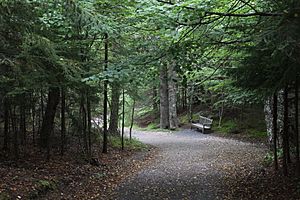
One of his major achievements was helping to pass the Civil Rights Act of 1964. This law was very important for equal rights in the U.S. He also helped create the Roosevelt Campobello International Park in Canada, near Franklin D. Roosevelt's old home. In 1965, he sponsored the Clean Water Act, which became a very important law for protecting water quality.
Muskie also worked with President Johnson on programs to help cities. He became an assistant Democratic whip in the Senate.
In 1967, Muskie visited Vietnam and became a strong voice against the Vietnam War. He urged President Johnson to end the bombing of North Vietnam. He also voted against certain appointments to the Supreme Court of the United States.
In his third term, Muskie continued his environmental work. He and other committee members introduced the Clean Air Act of 1970. This act required car companies to greatly reduce their pollution. He also helped write amendments to the Federal Water Pollution Act, known as the Clean Water Act. Even though President Richard Nixon tried to stop it, Congress overrode his veto, and the bill became law. This law set important standards for water health and pollution control.
Muskie also worked to limit the power of the "Imperial Presidency" and promote "New Federalism" ideas, which aimed to give more power to states and local governments. From 1975 to 1980, he chaired the United States Senate Committee on the Budget. In this role, he helped create the official process for how the U.S. federal budget is made.
Running for President
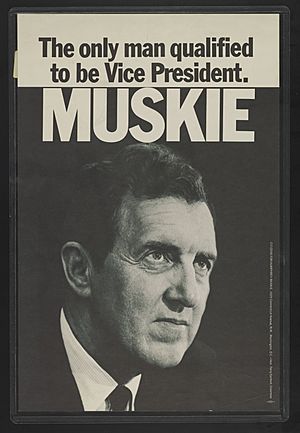
In 1968, Muskie was chosen to be the running mate for Vice President Hubert Humphrey in the presidential election. Humphrey picked Muskie because he was calm and came from a Catholic, Polish-American background. They narrowly lost the election to Richard Nixon and Spiro Agnew.
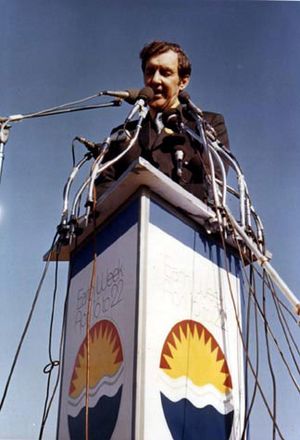
Before the 1972 election, many people thought Muskie would be the top candidate for the Democratic presidential nomination. He was popular in polls against President Nixon. However, his campaign faced challenges.
The "Canuck Letter" Incident
On February 24, 1972, a forged letter about Muskie was sent to a newspaper. This letter was part of a "dirty tricks" campaign by the Nixon campaign. The letter falsely claimed that Muskie had said insulting things about French Canadians. The newspaper also published an article making false accusations about his wife, Jane.
On February 26, Muskie gave a speech outside the newspaper's office during a snowstorm. He became emotional and criticized the newspaper. The press reported that he cried, which damaged his public image as a calm and reasoned leader. Later, during the Watergate scandal investigation, it was revealed that the "Canuck letter" was a fake, created to hurt Muskie's campaign.
In 1976, Muskie was considered as a possible vice-presidential candidate for Jimmy Carter, but Carter ultimately chose Walter Mondale.
U.S. Secretary of State, 1980–81
In April 1980, President Jimmy Carter asked Muskie to become the United States Secretary of State. This happened after the previous Secretary, Cyrus Vance, resigned. Muskie was chosen for his experience in foreign policy. He was confirmed by the Senate on May 8, 1980.
Muskie's time as Secretary of State was short. He faced challenges like the Soviet invasion of Afghanistan. He met with Soviet diplomats to try and get them to withdraw, but they refused.
Helping with Hostages
One of his most important tasks was dealing with the Iran hostage crisis. On November 4, 1979, 52 American diplomats and citizens were taken hostage in Tehran, Iran. Muskie worked to find a diplomatic solution. On January 20, 1981, the day Ronald Reagan became president, the 52 hostages were finally released. This was a major achievement that Muskie and his team helped to secure. Muskie left office two days before President Carter's term ended.
Later Years and Legacy
After leaving public office in 1981, Muskie continued to work as a lawyer. He also chaired the Institute for the Study of Diplomacy at Georgetown University.
In 1987, Muskie was appointed to the "Tower Commission". This group investigated the Iran–Contra affair, a scandal involving President Ronald Reagan's administration. The commission's report was critical of the president's actions. Muskie believed there was too much secrecy in government operations.
His Passing
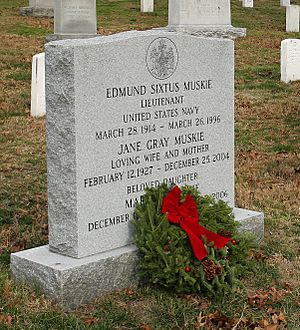
Edmund Muskie passed away on March 26, 1996, two days before his 82nd birthday. He was buried at Arlington National Cemetery in Virginia because of his service in the Navy during World War II. His wife, Jane, passed away in 2004 and was buried next to him.
Muskie was remembered in ceremonies in Washington, D.C., and Maine. President Jimmy Carter spoke at his funeral.
Historical Evaluations
Historians see Edmund Muskie as one of the most influential politicians in the History of Maine. As Governor, he helped modernize Maine's economy and infrastructure. He also changed the state's election date, which was a big deal.
Muskie is often called "the father of the 1960s environmental movement in America." His work led to the creation of the Clean Water Act and the Clean Air Act. These laws were crucial steps in protecting the environment in the U.S. and around the world.
His work in diplomacy was also important. As Secretary of State, he held important meetings with the Soviet government and helped with the release of the American hostages in Iran. President Carter awarded him the Presidential Medal of Freedom, the nation's highest honor, for his efforts.
Muskie was a strong supporter of the civil rights movement. He helped pass the Civil Rights Act of 1964 and supported the creation of Martin Luther King Jr. Day. He also played a key role in creating the United States budget process as chairman of the Senate Budget Committee.
Public and Political Image
Muskie's tall height (around 6 feet 4 inches) often led people to compare him to President Abraham Lincoln. He was seen as a typical New Englander with a direct and honest personality.
While he was generally quiet in public, he was known to have a strong temper when he felt it was needed. He was very detailed-oriented and expected his aides to be thorough. Voters respected his strong arguments and sharp mind. He was also known for being punctual and attending most Senate votes.
Honors and Memorials
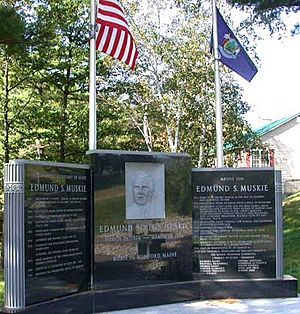
Muskie received many honors throughout his life. He was inducted into the American Academy of Arts and Sciences. He held the highest political office of any Polish American in U.S. history.
In Maine, March 28 is celebrated as "Edmund S. Muskie Day" every year. This is a public holiday in the state. Many universities gave him honorary degrees.
The American Bar Association gives an annual award in his name for lawyers who do free legal work. The United States Department of State also had a program called the Edmund S. Muskie Graduate Fellowship Program to help international students study in the U.S. The Edmund S. Muskie School of Public Service at the University of Southern Maine is named in his honor. His papers and personal items are kept at the Edmund S. Muskie Archives at Bates College.
Images for kids
See also
 In Spanish: Edmund Muskie para niños
In Spanish: Edmund Muskie para niños
 | James B. Knighten |
 | Azellia White |
 | Willa Brown |


